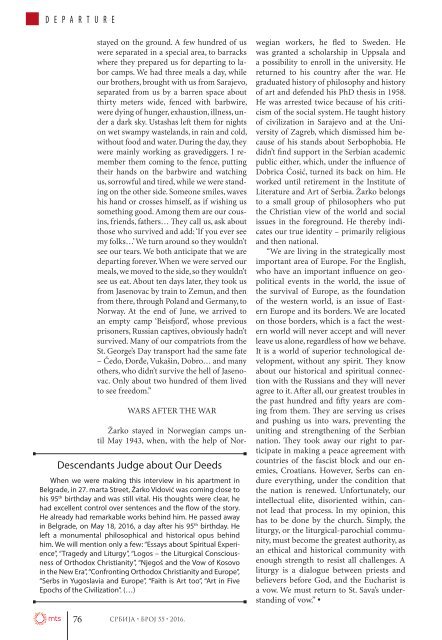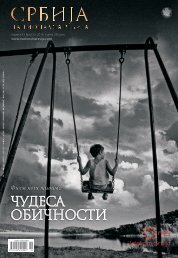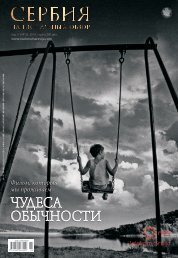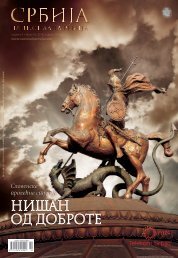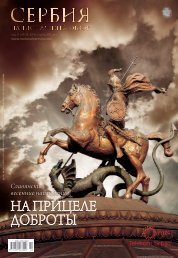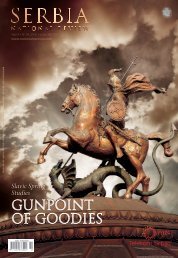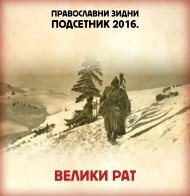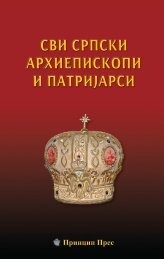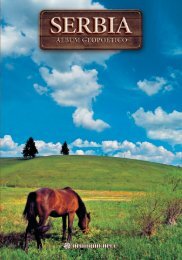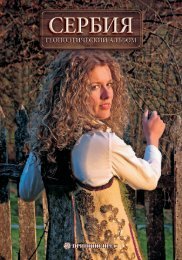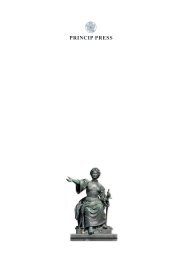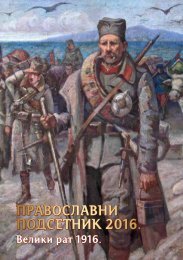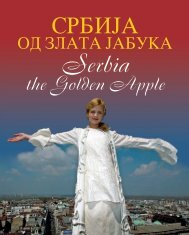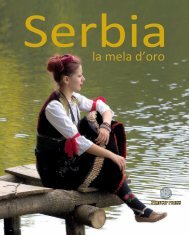Srbija - nacionalna revija - broj 55 - engleski - niska rezolucija
Create successful ePaper yourself
Turn your PDF publications into a flip-book with our unique Google optimized e-Paper software.
D E P A R T U R E<br />
stayed on the ground. A few hundred of us<br />
were separated in a special area, to barracks<br />
where they prepared us for departing to labor<br />
camps. We had three meals a day, while<br />
our brothers, brought with us from Sarajevo,<br />
separated from us by a barren space about<br />
thirty meters wide, fenced with barbwire,<br />
were dying of hunger, exhaustion, illness, under<br />
a dark sky. Ustashas left them for nights<br />
on wet swampy wastelands, in rain and cold,<br />
without food and water. During the day, they<br />
were mainly working as gravediggers. I remember<br />
them coming to the fence, putting<br />
their hands on the barbwire and watching<br />
us, sorrowful and tired, while we were standing<br />
on the other side. Someone smiles, waves<br />
his hand or crosses himself, as if wishing us<br />
something good. Among them are our cousins,<br />
friends, fathers… They call us, ask about<br />
those who survived and add: ‘If you ever see<br />
my folks…’ We turn around so they wouldn’t<br />
see our tears. We both anticipate that we are<br />
departing forever. When we were served our<br />
meals, we moved to the side, so they wouldn’t<br />
see us eat. About ten days later, they took us<br />
from Jasenovac by train to Zemun, and then<br />
from there, through Poland and Germany, to<br />
Norway. At the end of June, we arrived to<br />
an empty camp ‘Beisfjord’, whose previous<br />
prisoners, Russian captives, obviously hadn’t<br />
survived. Many of our compatriots from the<br />
St. George’s Day transport had the same fate<br />
– Čedo, Đorđe, Vukašin, Dobro… and many<br />
others, who didn’t survive the hell of Jasenovac.<br />
Only about two hundred of them lived<br />
to see freedom.”<br />
WARS AFTER THE WAR<br />
Descendants Judge about Our Deeds<br />
When we were making this interview in his apartment in<br />
Belgrade, in 27. marta Street, Žarko Vidović was coming close to<br />
his 95 th birthday and was still vital. His thoughts were clear, he<br />
had excellent control over sentences and the flow of the story.<br />
He already had remarkable works behind him. He passed away<br />
in Belgrade, on May 18, 2016, a day after his 95 th birthday. He<br />
left a monumental philosophical and historical opus behind<br />
him. We will mention only a few: “Essays about Spiritual Experience”,<br />
“Tragedy and Liturgy”, “Logos – the Liturgical Consciousness<br />
of Orthodox Christianity”, “Njegoš and the Vow of Kosovo<br />
in the New Era”, “Confronting Orthodox Christianity and Europe”,<br />
“Serbs in Yugoslavia and Europe”, “Faith is Art too”, “Art in Five<br />
Epochs of the Civilization”. (…)<br />
Žarko stayed in Norwegian camps until<br />
May 1943, when, with the help of Norwegian<br />
workers, he fled to Sweden. He<br />
was granted a scholarship in Uppsala and<br />
a possibility to enroll in the university. He<br />
returned to his country after the war. He<br />
graduated history of philosophy and history<br />
of art and defended his PhD thesis in 1958.<br />
He was arrested twice because of his criticism<br />
of the social system. He taught history<br />
of civilization in Sarajevo and at the University<br />
of Zagreb, which dismissed him because<br />
of his stands about Serbophobia. He<br />
didn’t find support in the Serbian academic<br />
public either, which, under the influence of<br />
Dobrica Ćosić, turned its back on him. He<br />
worked until retirement in the Institute of<br />
Literature and Art of Serbia. Žarko belongs<br />
to a small group of philosophers who put<br />
the Christian view of the world and social<br />
issues in the foreground. He thereby indicates<br />
our true identity – primarily religious<br />
and then national.<br />
“We are living in the strategically most<br />
important area of Europe. For the English,<br />
who have an important influence on geopolitical<br />
events in the world, the issue of<br />
the survival of Europe, as the foundation<br />
of the western world, is an issue of Eastern<br />
Europe and its borders. We are located<br />
on those borders, which is a fact the western<br />
world will never accept and will never<br />
leave us alone, regardless of how we behave.<br />
It is a world of superior technological development,<br />
without any spirit. They know<br />
about our historical and spiritual connection<br />
with the Russians and they will never<br />
agree to it. After all, our greatest troubles in<br />
the past hundred and fifty years are coming<br />
from them. They are serving us crises<br />
and pushing us into wars, preventing the<br />
uniting and strengthening of the Serbian<br />
nation. They took away our right to participate<br />
in making a peace agreement with<br />
countries of the fascist block and our enemies,<br />
Croatians. However, Serbs can endure<br />
everything, under the condition that<br />
the nation is renewed. Unfortunately, our<br />
intellectual elite, disoriented within, cannot<br />
lead that process. In my opinion, this<br />
has to be done by the church. Simply, the<br />
liturgy, or the liturgical-parochial community,<br />
must become the greatest authority, as<br />
an ethical and historical community with<br />
enough strength to resist all challenges. A<br />
liturgy is a dialogue between priests and<br />
believers before God, and the Eucharist is<br />
a vow. We must return to St. Sava’s understanding<br />
of vow.” <br />
76 SRBIJA • BROJ <strong>55</strong> • 2016.


